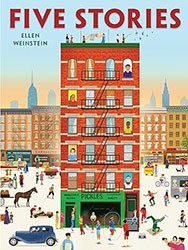What does it mean to be an American woman at the turn of the twentieth century? In Jennifer S. Brown’s captivating coming-of-age novel The Whisper Sister, Malka Soffer adopts the more American name “Minnie.” After emigrating to New York from Ukraine in 1920 with her mother Feige and brother Max, Minnie navigates between developing her identity and staying true to her role in the family.
The Soffer family yearns for the American dream, for their children to be educated and to pursue honorable careers. However, Minnie faces antisemitism and abuse in both her job and on the street, insecurities about money, and stressful memories from her past. After her mother gives birth to two more children in New York and a series of traumas affects the Soffer family, Minnie finds herself the heir to her father’s underground bar. He had purchased the bar soon after their arrival in New York and disguised it as a soda shop due to Prohibition. The family, especially Feige, struggled with the reality of the bar, where questionable Jews were involved in gangs and underground illegal alcohol sales. Feige would pretend she didn’t know what her husband was up to — her personal strategy for avoiding complicity in immoral behavior.
The book is set during the Prohibition era, from 1920 through 1932. Whereas depictions of this time period are sometimes limited to the Jazz Age and flappers, Brown gives readers a glimpse into the dangers and thrills of speakeasies through the eyes of daring and brave Jewish bar owner Minnie. These dangers include secret entryways, drunk men, anger and jealousy, and the need to pay off cops to avoid arrest. Being caught for violating the Volstead Act always remains a possibility, and can result in jail time or deportation.
Minnie finds freedom in the bar, though, and she makes many friends there, who support her through the process of becoming an American citizen. She thrills in her ability to take care of herself, manage the bar’s bookkeeping, fall into romance, and handle the kinds of serious scuffles that undoubtedly occur in this type of profession. Many customers at the speakeasy have not seen a female bartender before, and Minnie prides herself on her strength, which she attributes to her parents’ work ethic and dedication. The biggest insult she receives is in a New Yorker article about her bar, where the writer describes her as a “Yiddishe Momme” with a “guttural accent.” Minnie strives to differentiate herself from the Yiddish culture of her past; however, she realizes throughout the book that the Jewish community will always have her back, especially when she needs help with the challenging, dangerous situations she finds herself in. Minnie is an ambitious, independent entrepreneur whose experiences and decisions show the Prohibition era in a new light.
Jamie Wendt is the author of the poetry collection Laughing in Yiddish (Broadstone Books, 2025), which was a finalist for the 2022 Philip Levine Prize in Poetry. Her first book, Fruit of the Earth (Main Street Rag, 2018), won the 2019 National Federation of Press Women Book Award in Poetry. Her poems and essays have been published in various literary journals and anthologies, including Feminine Rising, Catamaran, Lilith, Jet Fuel Review, the Forward, Minyan Magazine, and others. She contributes book reviews to the Jewish Book Council. She won third prize in the 2024 Reuben Rose Poetry Competition and won second prize for the 2024 Holloway Free Verse Award through the Illinois State Poetry Society. Wendt holds an MFA in Creative Writing from the University of Nebraska Omaha. She lives in Chicago with her husband and two kids. Follow her online at https://jamie-wendt.com/ or on Instagram @jamiewendtpoet.





